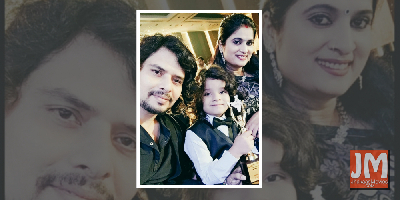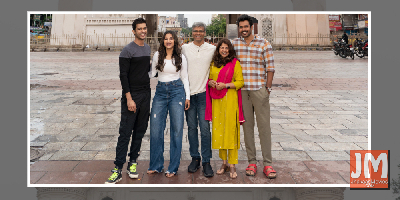 Aan Tiwari honoured with Best Child Actor award for Baal Shiv
Aan Tiwari honoured with Best Child Actor award for Baal Shiv Ghategi rahasymayi ghatnaye!
Ghategi rahasymayi ghatnaye! Amazon Prime Video unveils the 2021 Festive Line-up; brings a heady mix of Indian and International titles on the service
Amazon Prime Video unveils the 2021 Festive Line-up; brings a heady mix of Indian and International titles on the service Release: Music video of, Yeh Haalaath, from Mumbai Diaries 26-11
Release: Music video of, Yeh Haalaath, from Mumbai Diaries 26-11 Bhumi Pednekar feels she shares feel-good value with Akshay Kumar on screen
Bhumi Pednekar feels she shares feel-good value with Akshay Kumar on screen
'Late Night' is an entertaining satire

By Subhash K. Jha
"Late Night" (Amazon series); Cast: Emma Thompson, Mindy Kaling; Direction: Nisha Ganatra; Rating: *** and 1/2 (Three and a half stars)
I can't recall the last time when I had so much fun watching a film. For one, the imploding tensions of this tale of gender conflict and de escalating aspirations, are set in a talkshow boardroom where the magnificent Emma Thompson presides imperiously surrounded by a bevy of eager writers, all male.
To tilt the sex factor, Mindy Kaling, who wrote this ‘care'-brushed screenplay, is brought in. Of course the fact that she is female and Asian, is of no consequence. And of course we know just how this is going to go from here.
Significantly the screenplay doesn't spend too much time in showing the way the relationship between the two completely antithetical women develops. Instead, director Nisha Ganatra opens up the pulsating polemics to huge possibilities of wicked humour.
As Katherine, the talkshow queen manoeuvres her way through rapidly-mutating workplace ethics (she doesn't know her writers by name and has a number for each) and her frantic attempts to win back her falling relevance (a.k.a TRPs) with a sense of contrite cattiness befitting Meryl Streep in "The Devil Wears Prada".
Emma, looking uncannily like an older Manisha Koirala, plays the benign witch with an unapologetic yet graceful arrogance. Her scenes with her screen-husband (played by the magnificent John Lithgow) show a marriage that has gloriously survived a lifetime of challenges.
From the evening when Katherine tells her husband not to die just yet as she was too tired to attend his funeral, the film gives us a harvest of fantastic one-liners, all culled from everyday boardroom backchat and yet conveying a freshness that comes to a narrative only when it knows how to turn first person experiences into something universal without losing the sense of intimacy and warmth in the proceedings.
At times I couldn't tell whether Mindy Kaling's writing was mocking or celebrating gender inequalities at workplaces. For example, that sequence where Mindy's Molly Patel (is ‘Patel' the only surname they could think of for an Indian girl in Manhattan?) sobs her heart out under her desk after being reprimanded by Katherine; one of her (male) colleagues comes forward to console her reminding Molly that he didn't mean to challenge any of her hard-earned gender privileges. The sequence burst at the seams with a sharply-realized ambiguity.
The real triumph here is in telling a story where two women take centrestage and address important gender-related issues (including MeToo) without losing sight of the fact that audiences go to the movies to have fun.








